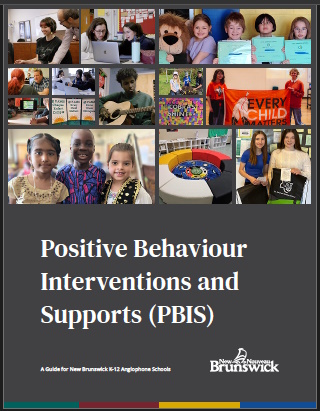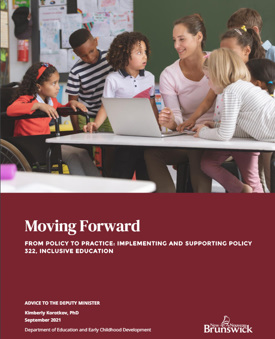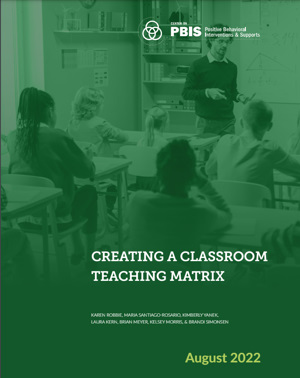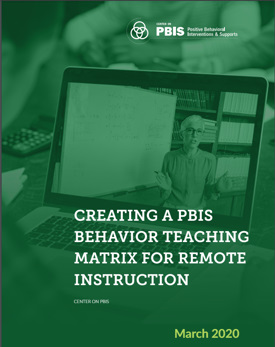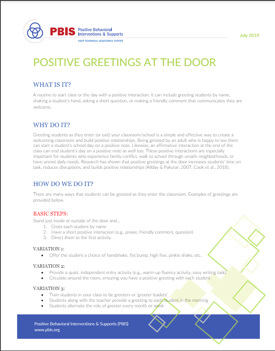
Resources
Also on this page:
EECD Policies

PBIS has engaged our students, staff, and community to look at a new ways of doing business in schools; focused on positivity, collaboration and data-driven decisions.
Brad MacDonald
Principal, Rothesay High School, ASD-South
New Brunswick Positive Interventions Support Research
Inclusive education within New Brunswick Education is an evolving and systemic model where children reach their full learning potential, supported by decisions that are based on the individual needs of students and founded on evidence. Over the past 35 years, since inclusive education was legislated, there has been a continuing evolution from viewing inclusive education through a disability-focused lens to viewing it as a
model that focuses on all students.
Author
Kimberly Korotkov, PhD
Creating A Classroom Teaching Matrix
This brief focuses on how to promote a positive teaching and learning environment by establishing positive classroom expectations, or norms, that reflect the shared values of a classroom community (i.e., educators, students, families). Specifically, this brief provides guidance for creating and using a classroom teaching matrix to explicitly identify, define, and teach (a) predictable classroom routines, (b) positive classroom expectations, and (c) critical social, emotional, and behavioral (SEB) skills.
Authors
Karen Robbie, Maria Santiago-Rosario, Kimberly Yanek, Laura Kern, Brian Meyer, Kelsey Morris, Brandi Simonsen
Creating A PBIS Behavior Teaching Matrix For Remote Instruction
This practice brief shares tips for maintaining continuity of learning through defining classroom expectations for remote (i.e., distance) instruction and online learning environments. With a few adaptations, teachers can use a PBIS framework to make remote learning safe, predictable, and positive.
Author
Center on PBIS
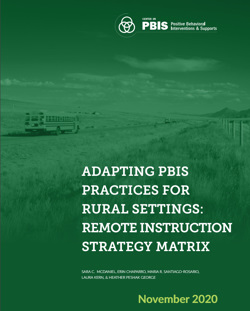
Adapting PBIS Practices For Rural Settings: Remote Instruction Strategy Matrix
When thinking of delivering typical instruction in schools, most envision a physical classroom with face-to-face interaction. Student and teacher needs vary as do the resources available across school sites. When public health crises, weather disasters, or other upsetting events impact the typical instructional routines, problem-solving and sustaining instructional supports with flexibility are critical.
Authors
Sara C. McDaniel, Erin Chaparro, Maria R. Santiago-Rosario, Laura Kern, Heather Peshak George
Positive Greetings at the Door – Practice brief
A routine to start class or the day with a positive interaction. It can include greeting students by name, shaking a student’s hand, asking a short question, or making a friendly comment that communicates they are welcome.
Author
pbis.org
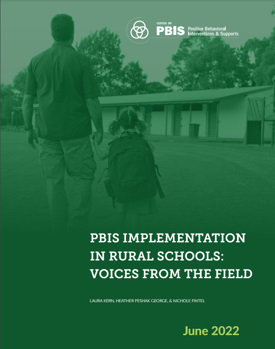
PBIS Implementation In Rural Schools: Voices From The Field
This brief summarizes themes from interviews with seven district- and school-level leaders who were asked to share experiences and lessons learned while implementing PBIS in their rural school(s).
Authors
Laura Kern
Heather Peshak George
Nichole Fintel

New Brunswick’s proactive approach to PBIS for an equitable inclusive system serves as an exemplar for the importance of promoting positive behaviour for every learner. Leaning into the idea that all learning is relational, schools have worked diligently to enhance relationships and to engage with learners and their families, staff, and communities. This personalized, strengths-based approach has been very successful, and highlights the dedication and passion that NB educators exhibit every day.
Dr. Kimberly Korotkov,
Senior Director: Integrated Support Services Alignment,
Department of Education and Early Childhood Development, New Brunswick, Canada
Department of Education and Early Childhood Development Policies
POLICY 322 – Inclusive Education
POLICY 701 – Policy for the protection of Pupil
POLICY 703 – Positive Learning and Working Environment
POLICY 705 – School and School District Crisis Planning
POLICY 713 – Sexual Orientation and Gender Identity

